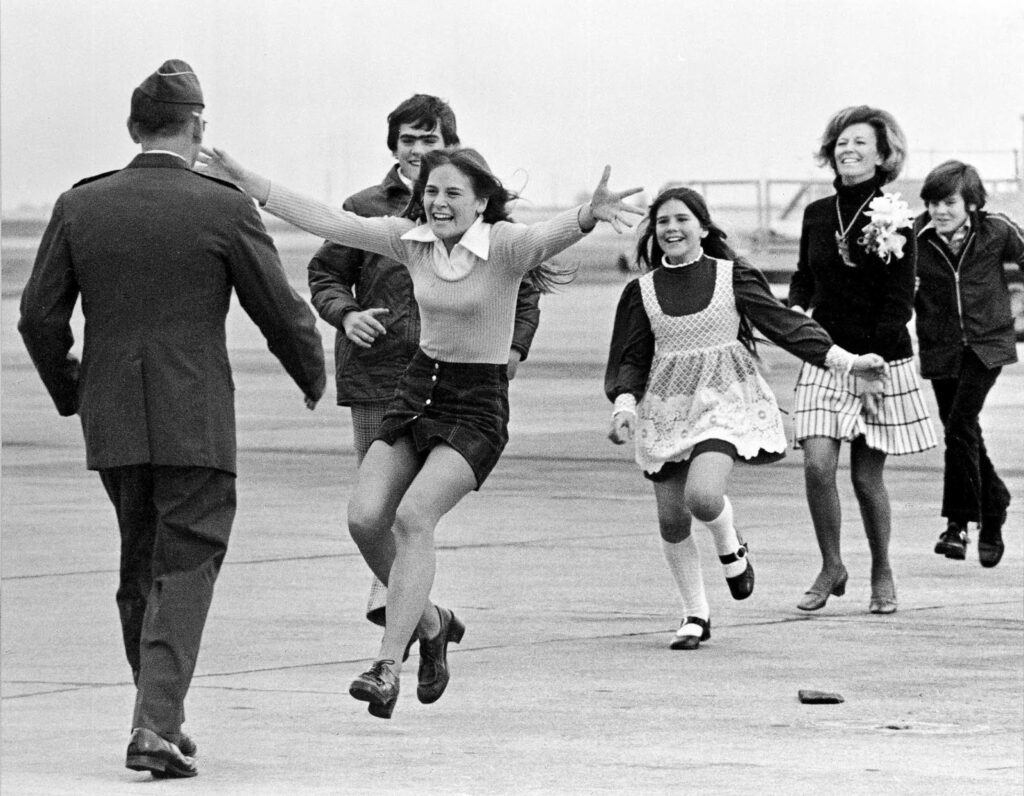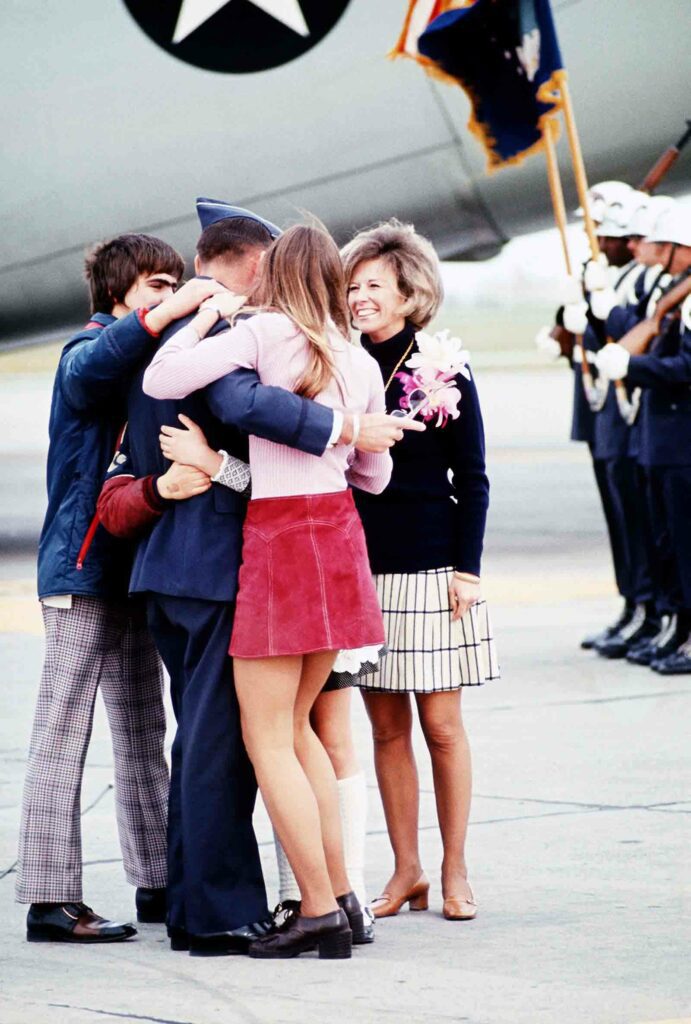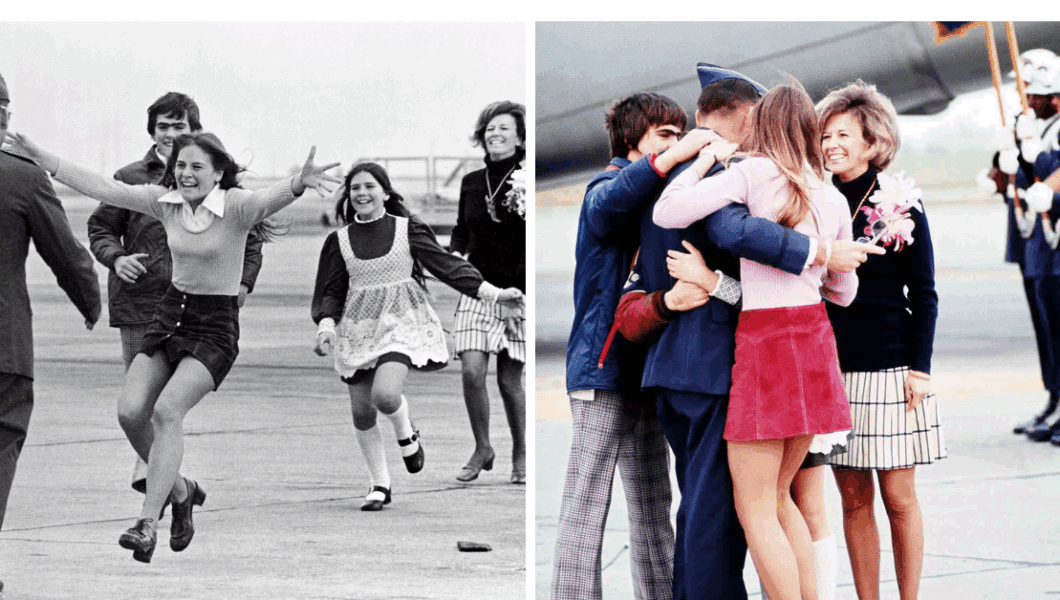

While he was a POW, his wife stole 140,000 of his wages; she also took his two younger children, house, car, forty percent of his future pension, and $300 a month in child support. She had to reimburse only $1500 of his travel expenses paid for with other guys.
On court, he battled and lost to her. Afterwards, he had to live with his mother in San Francisco tending to his older children. More like Prisoner of Wife, though.
Thirty years after the Stirm reunion, the scene—which has appeared in innumerable books, anthologies, and exhibitions—remains a part of the national psyche, sometimes acting as an inspiring postscript to Vietnam.
Lorrie Stirm Kitching once said about the picture and its legacy, “We have this very nice picture of a very happy moment, but every time I look at it, I remember the families that weren’t reunited, and the ones that aren’t being reunited today — many, many families — and I think, we are one of the lucky ones.”
“But there was more to the story than was captured on film,” another newspaper article notes. A chaplain had delivered a Dear John letter from his wife three days before Stirm arrived at Travis.
“I can’t help but feel ambivalent about it,” Stirm notes today of the picture. “I loved all of my children and still do, so I was quite happy to see them—but there was a lot to deal with. They had a tough time.”
Lorrie adds, “So much had happened—there was so much my dad missed out on—and it took a while to let him back into our lives and accept his authority.” Within a year of his comeback, her parents were divorcing.
Her mother rewed in 1974 and resides in Texas with her husband. After leaving the Air Force as a colonel in 1977, Robert worked as a corporate pilot and businessman. He married and went through divorce once more.
This is a piece from The Roanoke Times dated 1993. Acquired from The Virginia Tech Library.
The Roanoke Times: Homewcoming Events Ex-POW
Globally, the picture of his family welcoming an Air Force officer following his homecoming from a North Vietnamese camp represented the delight of a country bidding farewell to a nasty conflict. The scene was and still is a lie, to him.
Arms outstretched, both feet off the ground, his older daughter is sprinting to meet him, face split wide in a delighted smile. His younger daughter; his tall, beautiful wife; his two happy boys; close behind on the tarmac; running also.
The delight of this meeting jumps out from the pages of history: Robert Stirm, neat in his Air Force uniform, was at last home following over five 1/2 years in the Vietnam prison camps.
The Pulitzer Prize-winning photo that caught that extremely personal, but most public of events marks the end of American participation in the Vietnam War, the heartbreaking repatriation of 591 POWs in 1973. Twenty years later the scene is quite different.
A Vietnam history book opens to Stirm’s page in his house close to San Francisco. He looks at it. “I have several copies of the picture,” he continues, “but I don’t show it in the house.”
Just why? Stirm laughs. He gestures to the photo, to the tall mother just outperforming her little kid, clothed in a blue-and- white pleated skirt and blue sweater, wearing a big corsage. “Because of her,” he says only.
Two decades later, Stirm’s wrath and resentment seem more focused on the woman in the well-known black-and- white picture – his former wife, Loretta – than on the Vietnamese kidnappers who mistreated him.
He claims he survived the torture, the simulated executions, the dread-filled days and nights, therefore enabling him to go back to her only to be delivered a “Dear John” letter by a chaplain upon release.
“I have changed dramatically – forced into a situation where I finally had to grow up,” the letter said in part. ” Bob, I know deep down that we cannot be together and that it makes no sense to be miserable when you may act to change things. Too little time exists in life.
For Stirm, 60, it is tragic irony that such public a reunion had such an empty center. Taken by Sal Veder of The Associated Press, the picture “brought a lot of notoriety and publicity to me and, unfortunately, the legal situation that I was going to be faced with, and it was kind of unwelcomed,” Stirm said.
“In some respects, it’s hypocritical as my former wife broke off the marriage within a year or two following my dismissal. She also lacked the honour and honesty needed to tell the children straight forwardly. She lied. This image does not depict the reality she experienced accepting proposals of marriage from three different guys. It shows everyone there delighted to see me.
For Stirm’s older daughter, Lorrie Kitching, however, the picture catches a beautiful, unvarnished instant in time. She remembers bringing baskets of fan letters and newspaper cuttings from all around the world.
Living in San Mateo, California, Lorrie, 35, has second marriage and an 11-year-old son from her prior one. Media Sorcery, marketers of multimedia software, employs her in the sales division.
She stared at the image lately and saw her 15 1/2-year-old self poised to rush into her father’s arms, her soaring feet in her first high heels filling her eyes with tears.
“We just happened to come upon a fantastic piece of history,” she explains. “It never would have disappeared in my thoughts, but seeing that picture brings it all back again – simply all the delight there was.
“It was like Christmas. Like when Dad returned home, you knew Christmas was going to be fantastic but you had no idea exactly what would happen. Christmas morning came first. We knew a big present was waiting for us, so you were hurrying down the stairs. Everybody has a really pleased face.
Cindy, the youngest child, is clearly behind Lorrie in the picture. Two days before her father came home, she was turning eleven. She is sporting black jumper with lace pinafore, knee socks and Mary Janes, her preferred attire.
She is Cindy Pierson, 31 today; she is the mother of an 8-year-old child. “It sounds like another lifetime ago,” she remarks. “I look at the photo and I am not there. I don’t believe I participated actively in it. I was still young. When he departed, I didn’t really know him and felt it would be fantastic to have a dad since all of my friends had parents attending events.
Currently 34, Robert Stirm Jr. is the father of three sons and Concord, California, dentist. Cindy, his sister, handles office administration for him. He is fourteen in the picture, wearing a big smile.
People identified this picture, he notes. There is some type of renown in that. But my life was not particularly affected by the picture; it was my father returning home that did so.
Twelve at the time, Roger lags behind everyone. He is a captain in the Air Force, just like his father advised. Moreover Loretta? She still resides in Foster City and is wed to a lawyer. She said no to an interview.
She mentioned it in the letter St. Patrick’s Day 1973 sent to Stirm, but nobody knows why she showed up at Travis Air Force Base in California. Before returning to the United States, she travelled to the Philippines.
“I love you – we all love you, but you must remember how very unhappy we were together,” it advised. “We are quite suited and managed to make each other miserable; it was not your fault.
“I am not sure how proud we should be of you. I never missed a night with the kids praying for your safe return. The children have not forgotten their father; I have your pictures up and your certificates and have kept you very much with us while you were away.
“I would want to see you when you get home; but, if you would prefer not, I would understand.” Bob and Loretta met at a party shortly following Air Force cadet school graduation; she was married in 1955 at the age of 19. After he came back from Vietnam, they split; each remarried six months later.
“She had a tough job raising four children on her own,” Lorrie notes. “She was very young.” Stirm got custody of Lorrie and Robert Jr.; Loretta was given custody of Roger and Cindy. She also received the house and 42.9 percent of Stirm’s retirement pay, while the court noted a lot of evidence pointed to misbehaviour on her side during Stirm’s incarceration.
“It isn’t equitable. It’s not just, Stirm argues now. “I live with all the aches and pains from my imprisonment, but she continues to get paid.” Still, he notes, the couple have gathered for weddings and other family gatherings and that all four of his children get along with both of their parents.
Stirm retired from the Air Force in 1977 following 25 years of service. He joined Ferry Steel Products, the company his grandpa founded in San Francisco, but found it unsatisfactory. He came back a few years ago, though, following the bankruptcy of the firm employing him as a corporate pilot. Though it brings back the suffering, he will inevitably encounter the picture from time to time.
“I had four neat children, so the momentum to stay alive for the sake of my family was very strong,” he adds softly, “and what I believed to be a neat wife I wanted to get back to see.”
“That’s a strong motivator.”








No Comments